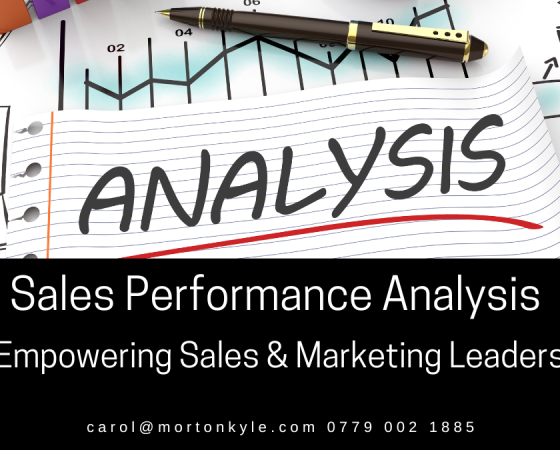Sales performance analysis is crucial to an organisation for several reasons.
It provides valuable insights and data-driven decision-making capabilities that can significantly impact the success of a company, and it improves agility to any changemes or movements before they become trends.
Sales Performance Analysis | What to Measure?
What gets measured gets managed!
We’ve all heard that, but what this philosophy can lead to is the collection of data that:
- No-one looks at
- Never gets used
- Confuses and masks the really important data
- Takes time to collect
So, my first warning here is spend as much time scoping out WHAT data you need to collect and then interrogate that liast based on a couple of things:
- WHY are you collecting this data set?
- WHAT does it tell you?
- HOW frequently will you collect it?
- HOW frequently will you look at it?
- WHAT decisions will it help you make?
- IMPACT – does this data have cause and effect levers?
- WHO owns this data?
- WHO controls the magnitude of this data?
Avoid this Common Issue | Sales Analysis Data Paralysis
As ever, the value is in the discussion.
Don’t rush this part of the process.
Spend some time talking around what you should and could measure, and the how and why.
I guarantee that spending a few hours thrashing this out is time and effort well spent.
At the beginning it can be all to easy to want to know everything,
BUT 6 months later you’ll look at maybe 5 or 6 key sales metrics or sales data points and their trends daily and others only monthly….some quarterly, and others not at all.
That’s how it should be!
But I mention this here so you don’t get totally thrown off-track by being swamped by sales data and sales analysis – because that will have the opposite effect. It will bind you instead of freeing you.
You will have contracted the dreaded, yet common, disease called Analysis Paralysis.
Most everyone gets it at some point.
It has a 100% recovery and no meds are needed.
Symptoms are feeling of confusion, overwhelm and ‘what the hell am I looking at!’
If you need any help with sorting this out and scoping some initial metrics then book a call >>>>> you’ll find the contact form on the right hand side of the text here, just drop a message in and I’ll call you back.
So, having got the how and the what to avoid out of the way let’s look at some of the benefits of having your eyes firmly glued on the right sales performance metrics for you and your business
When to Invest in Sales Performance Analysis
You can see the list here but in a nutshell, I use sales analysis and sales performance metrics most often with clients who are seeking to solve a couple of large / critical problems, and I’ll share those here as I suspect (if you are reading this then) you are probably experiencing the same
So – use sales analysis if you are:
- Struggling to get accurate and meaningful sales forecasts
- Unable to forecast strategically and technically
- Seeing wild peaks and troughs in sales performance
- Can’t pull together a credible financial / budget plan for the bank / investors
- Have a sales team who are performing differently across a wid spectrum even though their conditions – same prroduct range / pricing / territory / length of service / experience – are similar
- Can see the growth of a competitor at your cost
- Don’t have any sales dashbaords at all!
- Feel the sales function is in a rut and not operating at their maximum or even optimal level
- Are going for growth / maybe bringing on new products and services
- Want gto build a culture of continuous sales improvement
- Need to move accountab ility for sales across the group and not just in the sales team
- Introduce positive performance management and the associated culture of drive, ambition and growth

The Benefits of Sales Performance Analysis
Being able to reduce the risks associated with any sales change management project has got to be a win!
Using robust sales analysis will ensure you mobilise your leadership team to address only critical issues.
Therefore, the spend their time/effort mitigating the real reasons why sales revenue, margin and orders aren’t as high as they could be .
Plus, there are additional wins to be had from the right kind of detailed analysis:
Strategic Decision-Making:
Sales performance analysis offers a clear understanding of how the company’s products or services are performing in the market. You can use this data to make informed strategic decisions about product development, market expansion, pricing strategies, and resource allocation. This helps ensure that the company is focused on the right areas for growth and profitability.
This is the minimum level of sales analysis I would expect to see, and you’ve probably already got this in place. One of the key outputs I see from organisations who have a handle on this is they have a strong pricing model and know when to flex their pricing muscles.
Revenue and Profitability Insights:
Sales performance analysis provides detailed information about revenue generation, profit margins, and customer acquisition costs. Leadership teams can identify high-performing products, regions, or sales channels, sales reps and client personas allowing them to optimise resources and investments for maximum profitability. By analysing sales data, CEOs can also identify areas where cost reductions or operational efficiencies are needed.
Critical, and again, I would expect you have this inform in front of you anyway. To me, this section / type of data is more about how you are using it to stanradise / normalise / optimise performance across all areas. It’s about how you use this data to investigate where the sales leaks are so you can set about closing them
Market Understanding:
Analysing sales performance helps you gain a deeper understanding of market trends, customer preferences, and competitive dynamics. This knowledge enables you to adopt their preferred strategies 9as desired) in response to changing market conditions, stay ahead of competitors, and capitalize on emerging opportunities.
Speed to respond is a killer strategy….are you sure you have a regular heart beat on these things that would mean, if your market changed quickly, then you could too?
Performance Evaluation:
Sales performance analysis allows you to assess the effectiveness of the sales team and individual sales representatives. By identifying top performers and areas for improvement, you can implement targeted training, coaching, and incentive programs. This fosters a culture of continuous improvement and helps maximize the overall sales team’s productivity.
Maximising sales performance is a short term strategy.
what you really want to do is to optimise it, and stay responsive and agile in the process.
One of the critical red flags for me in a sales team is when of the, say, 10 people in the sales team, the individual performances are not aligned.
This screams lost opportunity, and higher than needed cost of sales.
Which then means lost opportunity, competitor growth and lost profits.
Alignment with Business Objectives:
Sales performance analysis helps you ensure that the sales team’s efforts are aligned with the company’s broader business objectives and goals. It provides insights into whether sales efforts are contributing to achieving key milestones, such as revenue targets, market share growth, or customer retention rates. If misalignments are identified against the master objectives, then you can make necessary adjustments to realign sales strategies with the overall business strategy before it’s too late!
Being able to chnage the final score whilst the game is still being played is critical – don;t leave it until 2 weeks after the quarter end to try and repair last quarters sales figures. You can make excuses to get your way out of that one!
But simply, sales performance analysis empowers leadership with data-driven insights that enable them to make informed decisions, drive revenue growth, optimize resources, and adapt to market changes AS THEY HAPPEN
It is a crucial tool for enhancing the strategic direction of the company, and reducing risks in the process.
Still using Sales Performance Analysis Reports Generated via the CRM?
My advice?
Don’t!
A sales CRM is a must for many things BUT sales performance analysis is not one of them.
For the sake of clarity I should outline what they are good for before I share with you why sales performance analysis from a CRM system will lead you down a rogue path more often than not…so
Use Your CRM Reporting For:
- Collecting leads
- Managing leads through the sales funnel
- Reporting on stages in the sales pipeline
- Marketing and nurture activies
- Automation
- Segmentation
- Acyivities
- Recency reports
- Product purchasers
- Close lost lists
In fact, use it as a data silo to extract and interrogate data from.
I have found most sales CRM’s to be less than idea for sales performance analysis because they rely on:
- Data integrity – rubbish in / rubbish out
- Human updates – forget to load an update in because you were busy? Oh dear
- Integration with other (maybe multiple systems) than all have their odd quirks – don’t get me started if there is a ‘y’ in the month, and a 5th Tuesday and a full moon all in the same week – it’s possible Armageddon! Exaggerating? Me? Noooooo, but you get my drift
It’s far easier, more accurate to get your reports in excel and start your sales performance analysis there – because here is the truth that most sales analysis completely ignored….
What you see in the excel spread sheet (or CRM reports for the unenlightened) is just a fraction of the story…it’s not even the movie trailer in terms of what’s really going on!

The Data in Sales Analysis | Is Something But Not Everything
Sales performance analysis data has many many layers, and the deeper you go into these layers, the more valuable and insightful the data becomes.
With this in mind, there are a couple of critical but often overlooked elements of sales analysis and sales performance analysis, and without these your conclusions are totally invalidated and without value in any way if you are looking to achieve any of the solutions we ‘ve outlined already
Whoever is doing your sales analysis needs to:
- Take this information and their findings back into the team and get them sense checked. They need to be able to analyse, interrogate and to question. They need to see behind the numbers. To look at patterns, trends, doubt everything until accurately verified
- Be able to model data. Not in a complex way – but in terms of – why is it this and not this? What would it need to be to make that happen? and then explore the gap. In doing so the sales analysis data starts to ‘warm-up’ and you can start to see where the sales improvement breakthroughs might come from
- Be able to engage people in getting excited about the ‘story’ that the sales data shares. Two heads, several heads even will be much better on spotting the wins
So, when you look at your sales performance data – make sure it’s not straight out the back of the CRM.
Instead ask that it be humanly sense checked with the people who generate it.
Then unpick it.
Relentlessly.
The value you will get from this alone will be invaluable on you on your sales improvement journey!
Still Not Sure?
The Cost of NOT Introducing Sales Performance Analysis
When sales performance analysis fails or is not conducted effectively, several negative outcomes can occur that impact the overall success of a company.
Here are 20 things that can go wrong when sales performance analysis fails:
- Missed Revenue Targets: Without proper analysis, the company may fail to meet its revenue and sales targets, leading to financial difficulties.
- Inaccurate Forecasting: Inaccurate sales data can result in unreliable sales forecasts, affecting resource allocation and inventory management…this is a killer you can avoid Simple Sales Forecasting
- Poor Resource Allocation: Inefficient allocation of resources can lead to wasted investments in underperforming products, regions, or sales channels.
- Lack of Accountability: Without analysis, it’s challenging to hold sales teams accountable for their performance, leading to complacency or unaddressed performance issues.
- Loss of Competitive Edge: Failure to monitor and adapt to market trends can result in a loss of competitive advantage and relevance in the market.
- Ineffective Sales Strategies: Without insights from analysis, sales strategies may be based on assumptions rather than data, resulting in suboptimal approaches.
- Low Customer Satisfaction: Inadequate analysis can lead to misunderstandings of customer preferences, resulting in products or services that do not meet customer needs.
- High Customer Churn: Lack of analysis can contribute to customer churn as the company may not identify declining customer satisfaction or loyalty.
- Inefficient Sales Processes: Without analysis, inefficiencies in the sales process may go unnoticed, leading to wasted time and effort.
- Subpar Sales Training: Ineffective analysis can hinder the identification of training needs, resulting in undertrained sales teams.
- Misaligned Incentives: Without proper analysis, incentive structures may not be properly aligned with desired sales outcomes, leading to demotivated teams.
Still not convinced sales performance analysis is a critical success factor in your organisation?
Ok.. let’s continue
- Over-Reliance on Historical Data: Without ongoing analysis, reliance on outdated historical data can lead to poor decision-making in dynamic markets.
- Neglected Market Segments: Failure to analyse sales data can result in neglecting potential market segments or customer demographics.
- Ignored Customer Feedback: Lack of analysis may lead to disregarding valuable customer feedback, hindering product improvement.
- Failed Market Expansion: Without accurate analysis, expansion into new markets may be misinformed, resulting in costly failures.
- Ineffective Pricing Strategies: Without analysis, pricing decisions may not reflect actual market demand and competitive positioning.
- Unidentified Sales Trends: Failing to analyse data can lead to missed opportunities in identifying emerging sales trends or shifts in customer behavior.
- Wasted Marketing Efforts: Poor analysis can result in misguided marketing campaigns that do not resonate with the target audience.
- Difficulty in Performance Evaluation: Lack of analysis can hinder the fair evaluation of sales team performance, leading to unfair assessments and morale issues.
- Strategic Misdirection: Ineffective analysis can lead to misguided strategic decisions that negatively impact the company’s overall direction and growth.

Summary: Sales Performance Analysis
Sales performance analysis is essential for informed decision-making.
This allows for strong strategic planning, and the overall stability of a company’s performance.
It’s the first key to unlock the sales improvement.
It fosters positive performance management and it introduces accountability and continuous sales improvement throughout the ranks.
Failure to conduct proper analysis can have far-reaching and detrimental consequences across various aspects of the business.
To discuss how your organisation and senior leadership team can benefit from looking at sales performance analysis then get in contact – call Carol on 0779 002 1885 – and we can spend some time looking at where you are now versus where you would ideally like to be

Who am I?
I’m Carol Griffiths, and I’ve spent the last 30+ years in the trenches of sales—fixing broken pipelines, rebuilding underperforming teams, and helping businesses close more deals at higher margins.
I’ve worked with global brands, challenger firms, and fast-growth sales teams, helping them:
✔ Fix underperforming pipelines – turning ghosted leads into closed deals.
✔ Increase win rates – without discounting or chasing bad-fit prospects.
✔ Build sales systems that actually work – so you don’t waste time on ‘busy work’ that doesn’t convert.
I’m not another ‘sales trainer.’ I don’t teach theory. I fix sales problems – fast. And if you’re still reading, it means you’ve got a problem that needs fixing.
I know how sales leaders think because I’ve been one. I know what the board wants because I’ve sat in those meetings.
And I know what works – because I’ve done it, tested it, and proved it across industries, markets, and economic downturns.


Comments are closed.